Overview
Have you ever wondered how e-commerce can change the game for manufacturers? Well, this article dives into just that! It explores how integrating e-commerce solutions can really boost manufacturing efficiency through various clever strategies and tools. By automating processes and improving data accuracy, manufacturers can gain real-time insights. This not only leads to increased sales but also better inventory management and significant cost savings.
Imagine the difference it could make when everything runs smoothly and efficiently! With e-commerce, manufacturers can streamline operations and focus on what really matters. So, why not take a closer look at how these solutions can transform your business? Let's explore the benefits together and see how you can get started on this exciting journey!
Introduction
The manufacturing industry is at a pivotal crossroads. Integrating eCommerce solutions isn’t just a trend anymore; it’s a must for operational success. As manufacturers like us navigate the complexities of modern markets, the potential for enhanced efficiency, improved customer experiences, and data-driven decision-making through integrated systems is huge. But here’s the challenge: how can we effectively implement these solutions to not just keep up, but truly thrive in this competitive landscape?
This article dives into ten transformative ways eCommerce integration can redefine manufacturing efficiency. We’ll share insights and strategies for those of us ready to embrace the future. Are you ready to explore how these changes can benefit you?
GenAlpha Technologies: Streamline Operations with Integrated eCommerce Solutions
At GenAlpha Technologies, we’re all about providing integration e commerce solutions that truly boost operational efficiency for producers. Imagine automating essential processes like order management and client interactions—this means fewer manual errors and smoother workflows. Take our Equip360 platform, for example. It’s a game changer, offering real-time inventory updates and order tracking capabilities. This way, producers can swiftly and consumer needs, leading to better responsiveness and satisfaction.
Did you know that 39% of manufacturers report revenue growth directly from online commerce investments? And it gets better—38% of those using GenAlpha's tools see improved business efficiency. There are countless success stories out there! For instance, Alliant Power has saved over 100 hours a month on manual order entry just by using Equip360. As the manufacturing landscape continues to evolve, embracing online commerce is essential to stay competitive in 2025 and beyond.
So, if you want to tap into these benefits, why not consider the integration e commerce systems that align cohesively with your operational goals? It’s time to take action and join the movement!
Enhanced Customer Experience: How Integration Elevates Engagement for Manufacturers
Have you ever thought about how the integration e commerce solutions can really boost user experience? They enable at every touchpoint, making life easier for everyone involved. Manufacturers can step up their game by offering personalized experiences, like tailored recommendations and simplified purchasing processes. For instance, when integrated digital warranty management systems are in place, users can easily access warranty info and submit claims. This not only builds trust but also enhances satisfaction.
Did you know that 80% of consumers prefer brands that offer personalized experiences? It's true! Plus, brands that focus on delivering outstanding consumer experiences rake in about 5.7 times more revenue than those that don’t. By prioritizing these strategies, manufacturers can enhance the consumer journey through integration e commerce, which ultimately drives loyalty and repeat business.
As Kerry Bodine puts it, 'Exceptional customer experiences are the only sustainable platform for competitive differentiation.' So, what are you waiting for? Let’s start prioritizing those exceptional experiences!
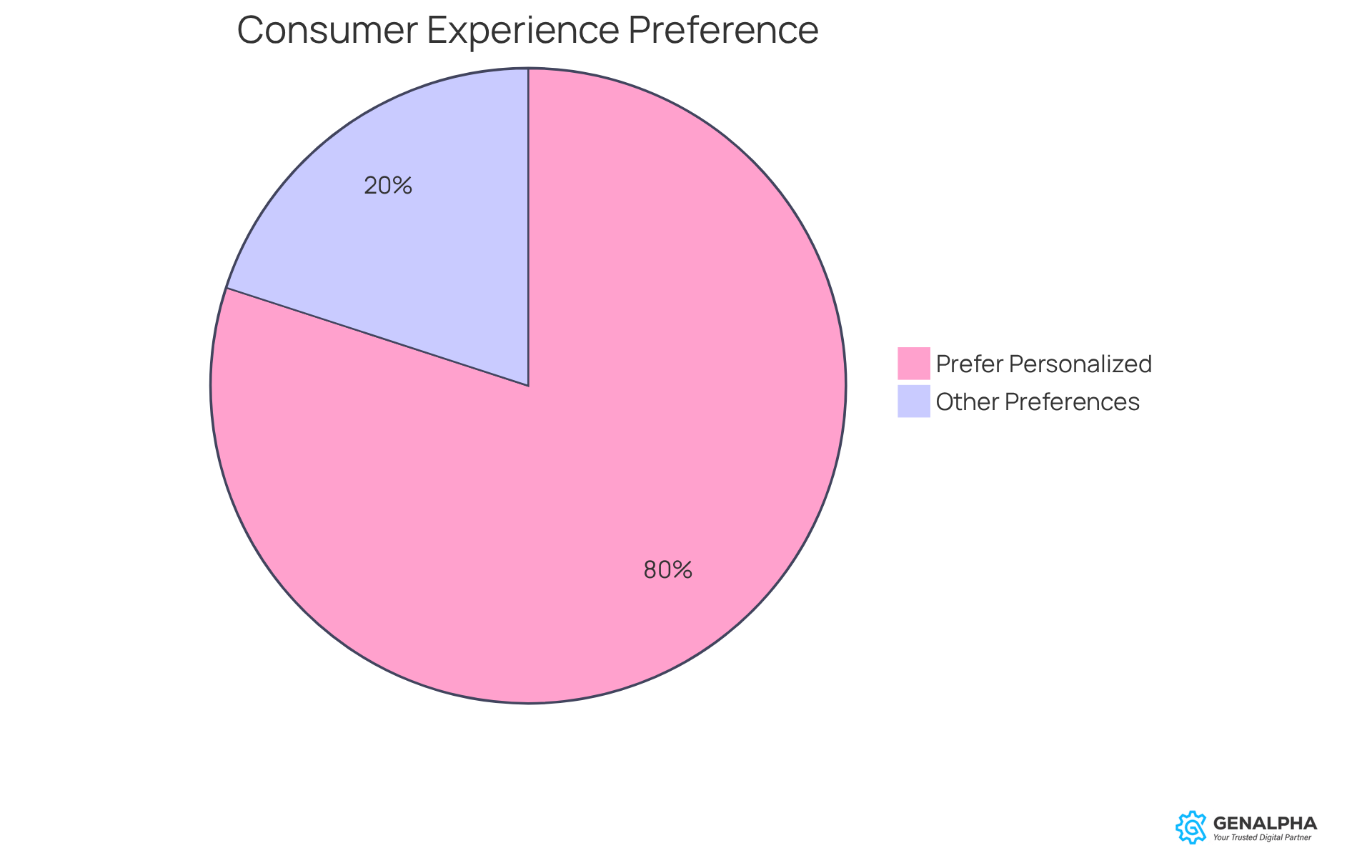
Improved Data Accuracy: Ensuring Quality Control Through Integration
Have you ever thought about how the integration e commerce solutions can really boost data accuracy? By centralizing information across different platforms, they ensure that every department—from sales to inventory management—works with the same up-to-date data, supporting the integration e commerce strategy. This not only minimizes discrepancies but also allows producers to uphold strict quality control standards. With trustworthy information at their fingertips, they can .
According to a study by PwC, AI can enhance data accuracy by up to 80%. This highlights just how crucial centralized information is for achieving quality excellence through integration e commerce. Looking ahead to 2025, the importance of having centralized data will only grow, as producers will increasingly rely on data-driven insights to thrive in a competitive landscape.
Industry experts stress that effective data management is essential for maintaining quality excellence. As Bermingham, Castleman & Pierce Inc. wisely said, 'Quality is never an accident; it is always the result of high intention, sincere effort, intelligent direction, and skillful execution.'
Manufacturers that have embraced centralized data strategies are already seeing remarkable results, including enhancements in integration e commerce, improved product quality, and more streamlined processes. Case studies showcasing AI's impact on accuracy in document processing really underline the tangible benefits of this approach. So, what are you waiting for? Let's dive into the world of centralized data and see how it can transform your operations!
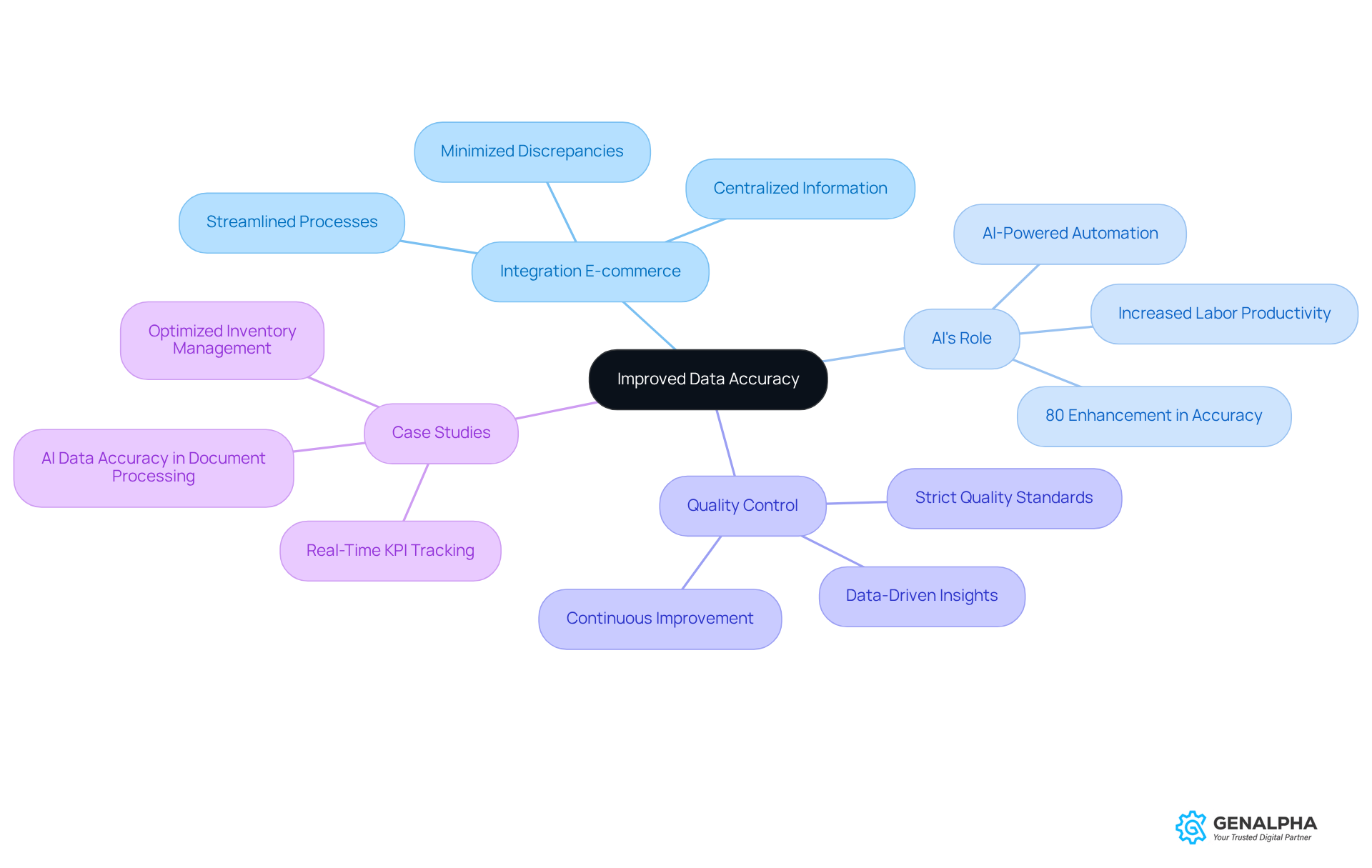
Optimized Inventory Management: Reducing Excess Stock with Integration
Imagine managing your inventory with ease—knowing exactly what’s in stock and what’s flying off the shelves. Integration e commerce makes it possible to provide real-time visibility into your inventory and sales trends. With the power of analytics, manufacturers can accurately , which is crucial for cutting down on excess stock and minimizing holding costs. This proactive approach not only boosts cash flow but also ensures that products are available when customers need them, significantly enhancing service levels.
For example, companies that embrace real-time analytics often see a noticeable drop in excess inventory. Some even report an impressive 25% increase in forecasting accuracy! As Rupert Monier-Williams, the Founder and Managing Director of Decorum Vintners, puts it, 'Decorum aimed to operate efficiently, reducing costs and errors.' These advancements empower producers to make informed decisions, optimize their operations, and ultimately strengthen their competitive edge.
However, it’s not all smooth sailing. Many producers struggle with surplus stock, and a staggering 74% of companies have faced shortages of essential components and materials. So, how do we tackle these challenges? Strategic planning and effective integration e commerce are key to thriving in today’s ever-changing market. What steps are you taking to ensure your inventory management is up to par?
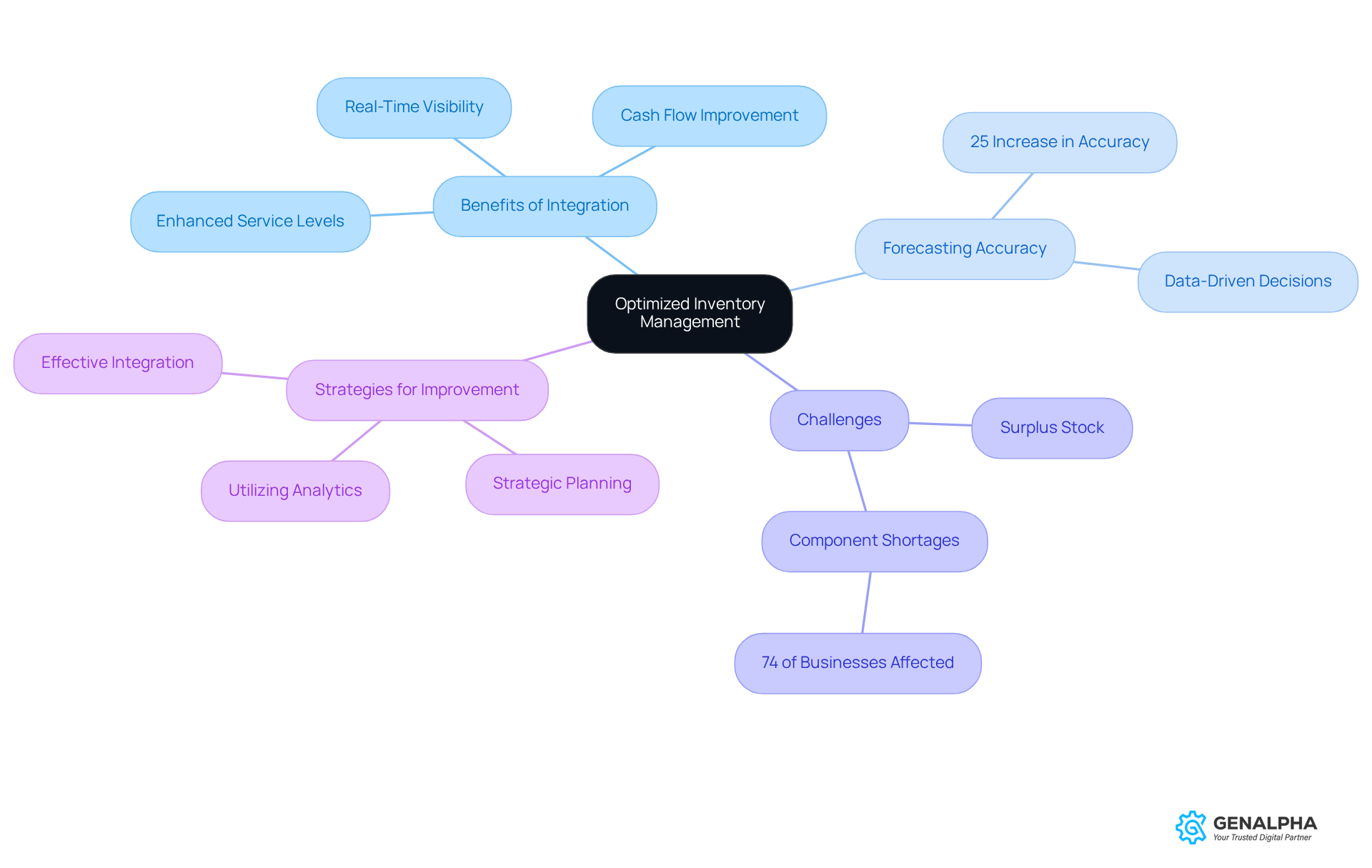
Seamless Operations: The Role of ERP Integration in eCommerce Success
The integration e commerce of ERP systems with eCommerce platforms is super important for producers looking to boost their operational efficiency. This integration e commerce ties together various business functions—think finance, supply chain management, and customer service—creating a smooth workflow that cuts down on data entry errors and streamlines processes. As a result, producers can automate workflows, leading to significant improvements in both productivity and accuracy.
Looking ahead to 2025, the significance of ERP systems is set to grow, with the global ERP market projected to hit around $1,266 billion. This growth shows just how much businesses are relying on integrated systems to enhance efficiency and responsiveness in manufacturing. For example, companies like Foodcare have successfully implemented integration e commerce by linking their NetSuite ERP system with eCommerce solutions, allowing them to effectively cater to both B2B and direct-to-consumer markets, which in turn boosts their operational capabilities.
The effect of automated workflows on manufacturing efficiency is truly remarkable. By reducing manual tasks, producers can focus on strategic initiatives that foster growth. Did you know that a study found 91% of organizations saw optimized inventory levels after implementing ERP systems? This really highlights the tangible benefits of integration e commerce.
Industry leaders are vocal about the importance of connecting business functions through integration. As one expert put it, "An enterprise resource planning (ERP) system is the key to integrating different business functions across an organization." This sentiment is backed by the fact that 83% of organizations report that their ERP projects , showcasing how effective these systems are in achieving operational goals. By embracing ERP integration, manufacturers are setting themselves up to thrive in an increasingly competitive landscape. So, what are you waiting for? It's time to consider how ERP can elevate your operations!
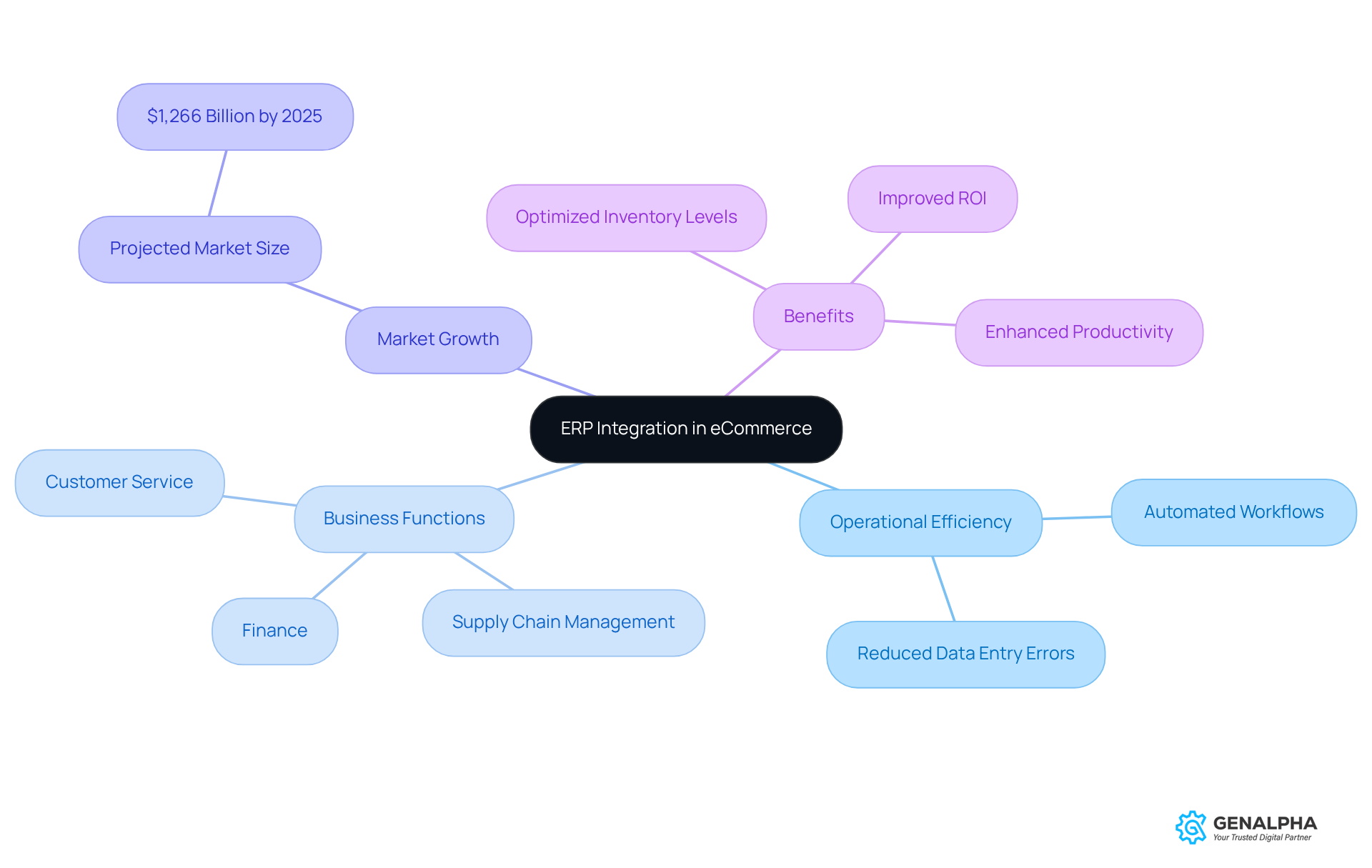
Increased Sales Efficiency: Automating Processes Through Integration
Have you ever thought about how the integration e commerce solutions can truly change the game in sales? By automating key tasks like order processing, invoicing, and client follow-ups, sales teams can focus more on what truly matters—building relationships with clients. This shift not only speeds up the sales cycle but also makes the whole process smoother.
For instance, producers who have jumped on the automated invoicing bandwagon report a 20% reduction in human errors. That’s a big win for smoother transactions and more accurate billing! Plus, studies show that companies using automation in their sales processes can boost productivity by 15%. It’s clear that these technologies are vital for modern manufacturing.
As we look ahead to 2025, it’s exciting to note that 74% of sales professionals believe AI will redefine their roles. This trend is not just about improving efficiency; it’s also about enhancing the client experience. So, if you’re a producer looking to thrive in today’s competitive landscape, is a strategy you won’t want to overlook. How are you planning to adapt to these changes?
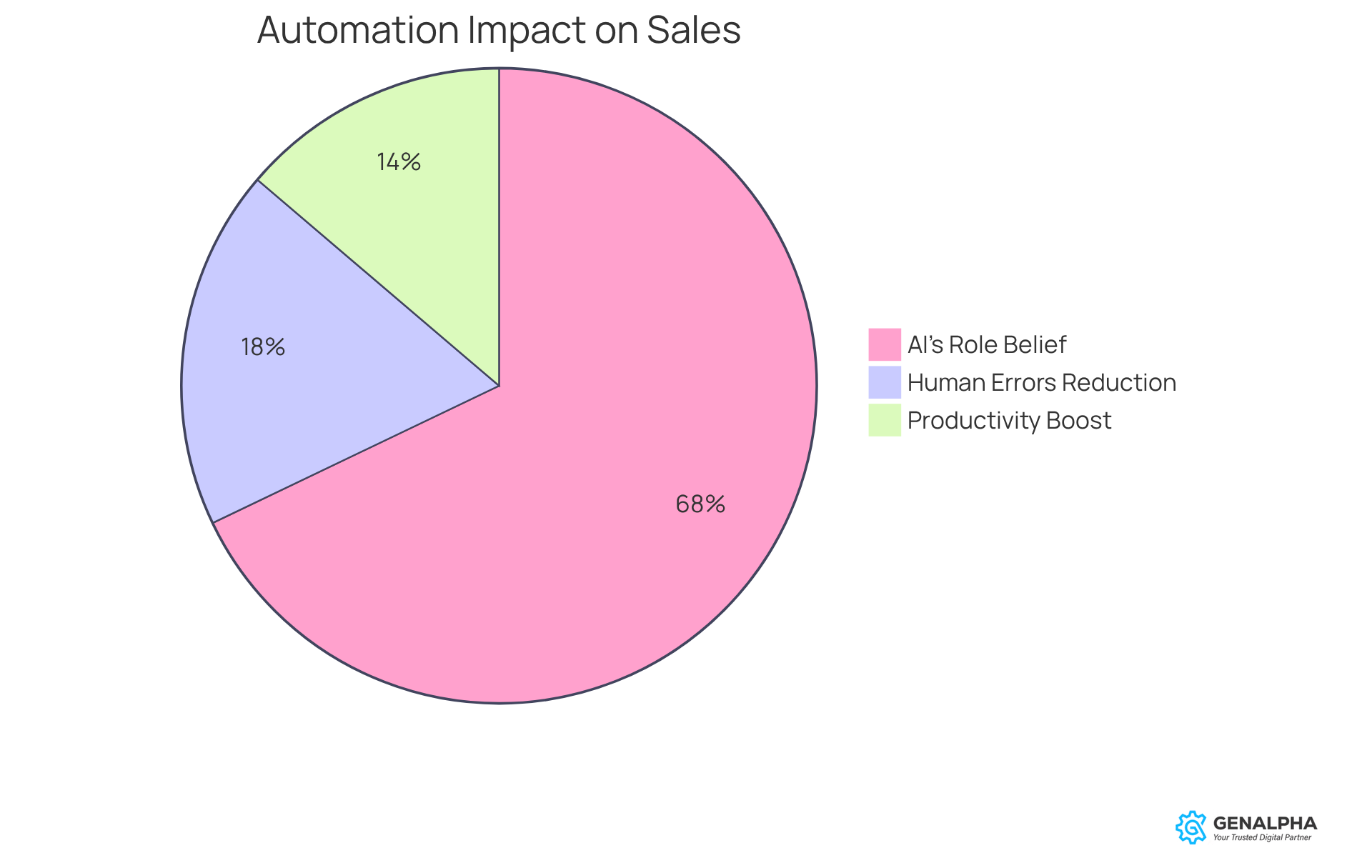
Data-Driven Insights: Leveraging Analytics for Strategic Decision-Making
Have you ever thought about how analytics from integration e commerce can really change the game for producers? By tapping into these insights, they can gain a clear understanding of consumer behavior, sales trends, and how their operations are performing overall. This isn’t just about numbers; it’s about making smart choices that can boost efficiency, fine-tune marketing efforts, and keep clients happy.
For instance, knowing when customers are most likely to buy can help with inventory management and staffing. Imagine the improved service levels that come from being prepared! Plus, manufacturers who embrace augmented analytics have seen an impressive 15-20% boost in operational efficiency within just the first year. That’s a testament to the power of data-driven insights.
Industry experts point out that companies prioritizing data in their decision-making are not only more resilient but also 23 times more likely to attract new clients and 19 times more likely to turn a profit. This really highlights how crucial it is to for manufacturing success through integration e commerce, especially as we look toward 2025 and beyond.
So, how can manufacturers make the most of these insights? Investing in advanced analytics tools and nurturing a data-driven culture within their organizations could be the key. What do you think? Are you ready to dive into the world of analytics and see how it can transform your business?
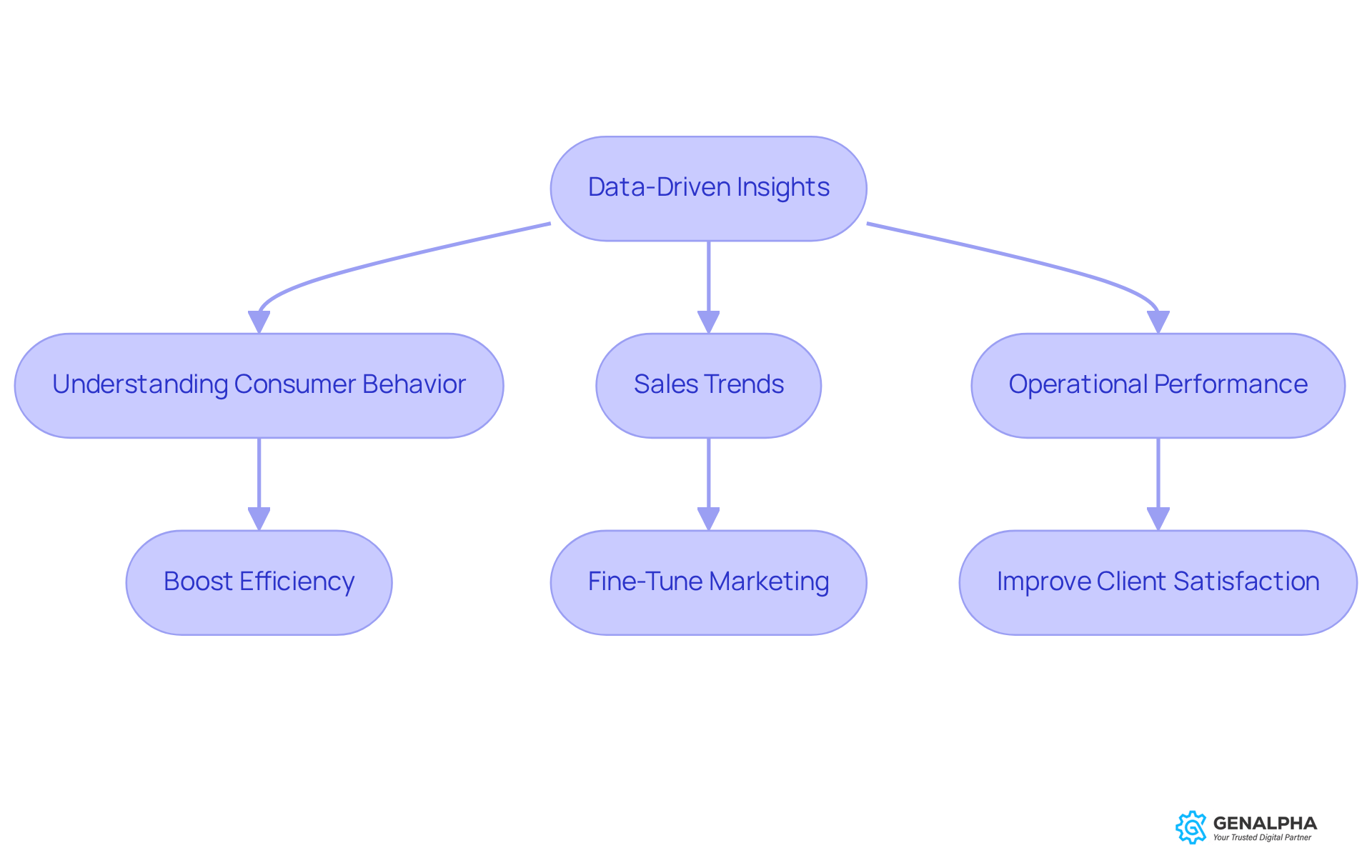
Enhanced Visibility: Monitoring Performance Across Sales Channels
Have you ever wondered how integration e commerce solutions can really change the game? Well, they significantly boost visibility into performance across various sales channels. Now, producers can easily track key metrics like sales volume, client engagement, and inventory turnover in real-time. This means and issues quickly, allowing for proactive responses that seize emerging opportunities.
For example, did you know that 79% of organizations using real-time analytics reported improved business outcomes? That's a testament to the transformative power of these insights! Additionally, companies that embrace real-time performance monitoring can cut operational costs by up to 20%. This really highlights how real-time analytics contributes to operational efficiency.
Looking ahead, Gartner predicts that by 2025, nearly 95% of organizations will invest in real-time data analytics to enhance decision-making. By fostering a culture of continuous improvement through real-time data, manufacturers can achieve greater operational excellence and maintain a competitive edge in the market. So, are you ready to explore how these insights can work for you?
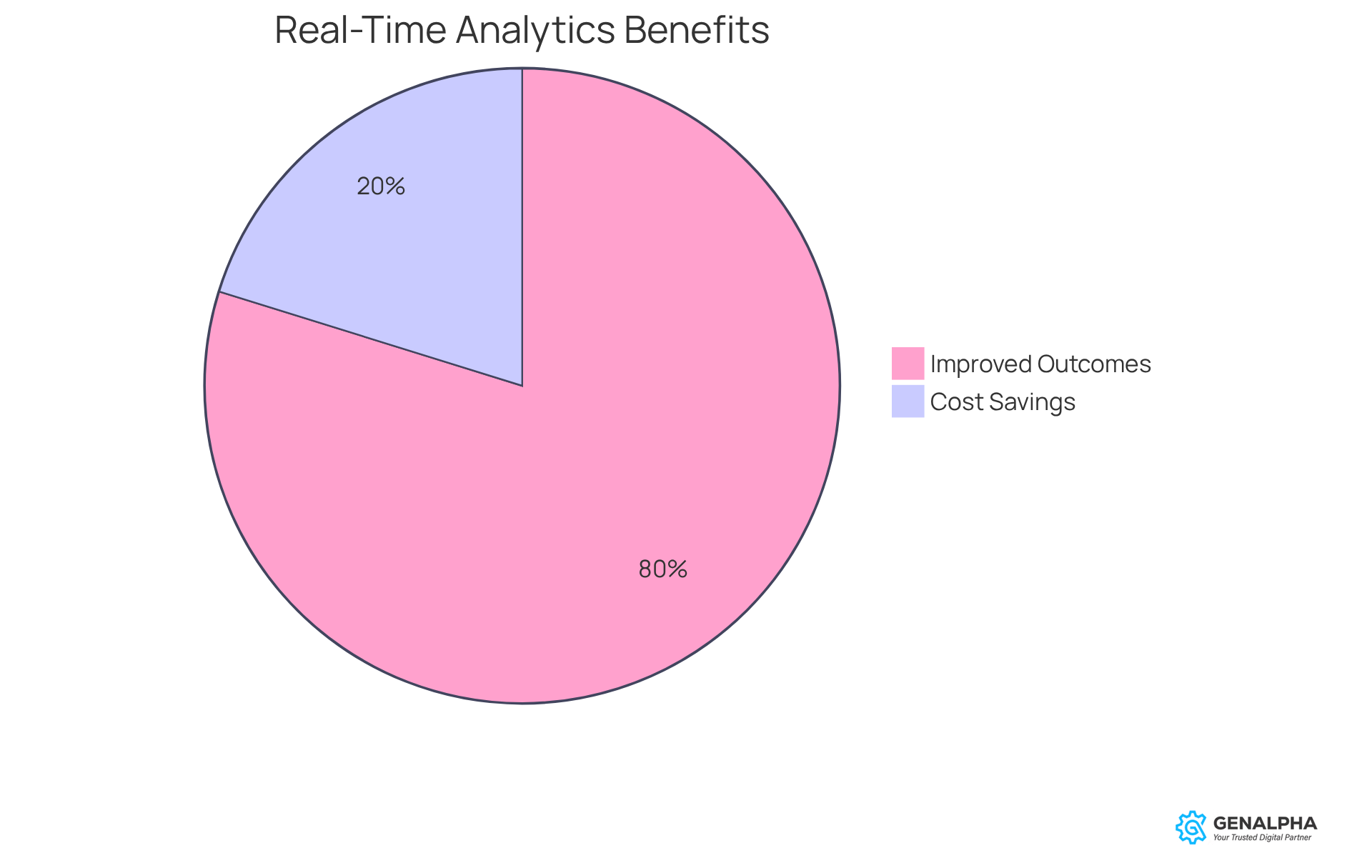
Boosted Customer Loyalty: Creating Consistent Experiences Through Integration
Have you ever noticed how much more likely we are to stick with a brand when we get the same great experience everywhere? That’s the magic of creating consistent client experiences through integration e commerce solutions. When you can access the same level of service and information across all channels, it just feels right, doesn’t it?
For instance, think about how handy it is when integration e commerce allows you to check your order history and warranty information without a hitch. This seamless access not only but also makes you more likely to return. So, why not embrace these solutions? After all, a little consistency goes a long way in building loyalty!
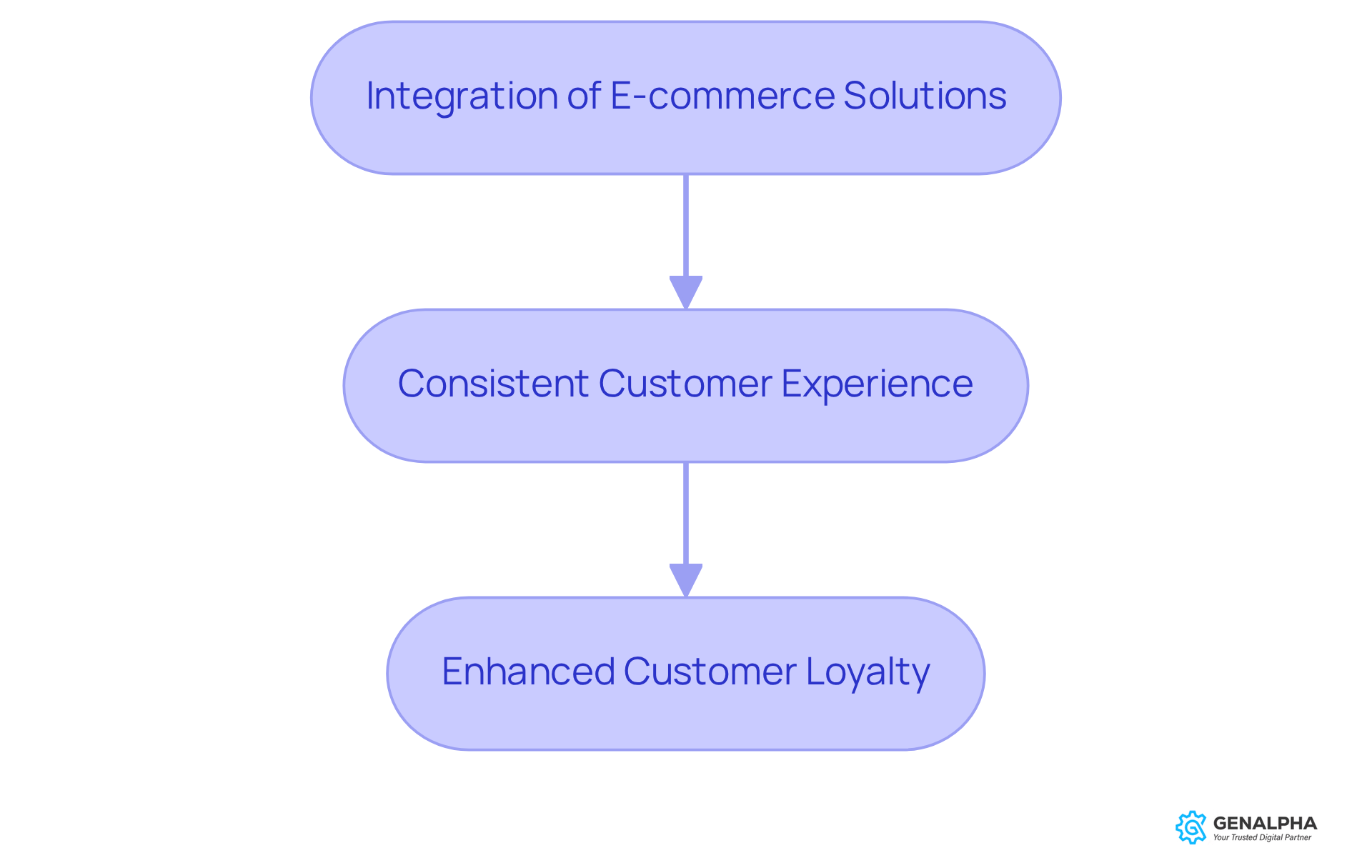
Cost Savings: Reducing Manual Processes and Errors with Integration
The integration e commerce solutions can significantly assist producers in reducing manual processes and mistakes, leading to substantial cost savings. Imagine automating tasks like order entry and inventory updates—this not only reduces human error but also lowers labor costs. Did you know that nearly 50% of today’s work activities could be automated with the technology we have? This shift allows employees to focus their energy on more strategic initiatives that drive growth.
Additionally, automation can slash labor costs by as much as 10% to 50%. It streamlines operations and boosts productivity, which is a win-win for everyone involved. Workflow automation not only saves money but also facilitates the integration e commerce, empowering teams to concentrate on high-value tasks and ultimately in manufacturing.
For example, Monin’s use of Weever saved them over 3 hours a day! This showcases the real-world benefits of automation. So, what are you waiting for? Embracing these solutions could be your next big step toward success!
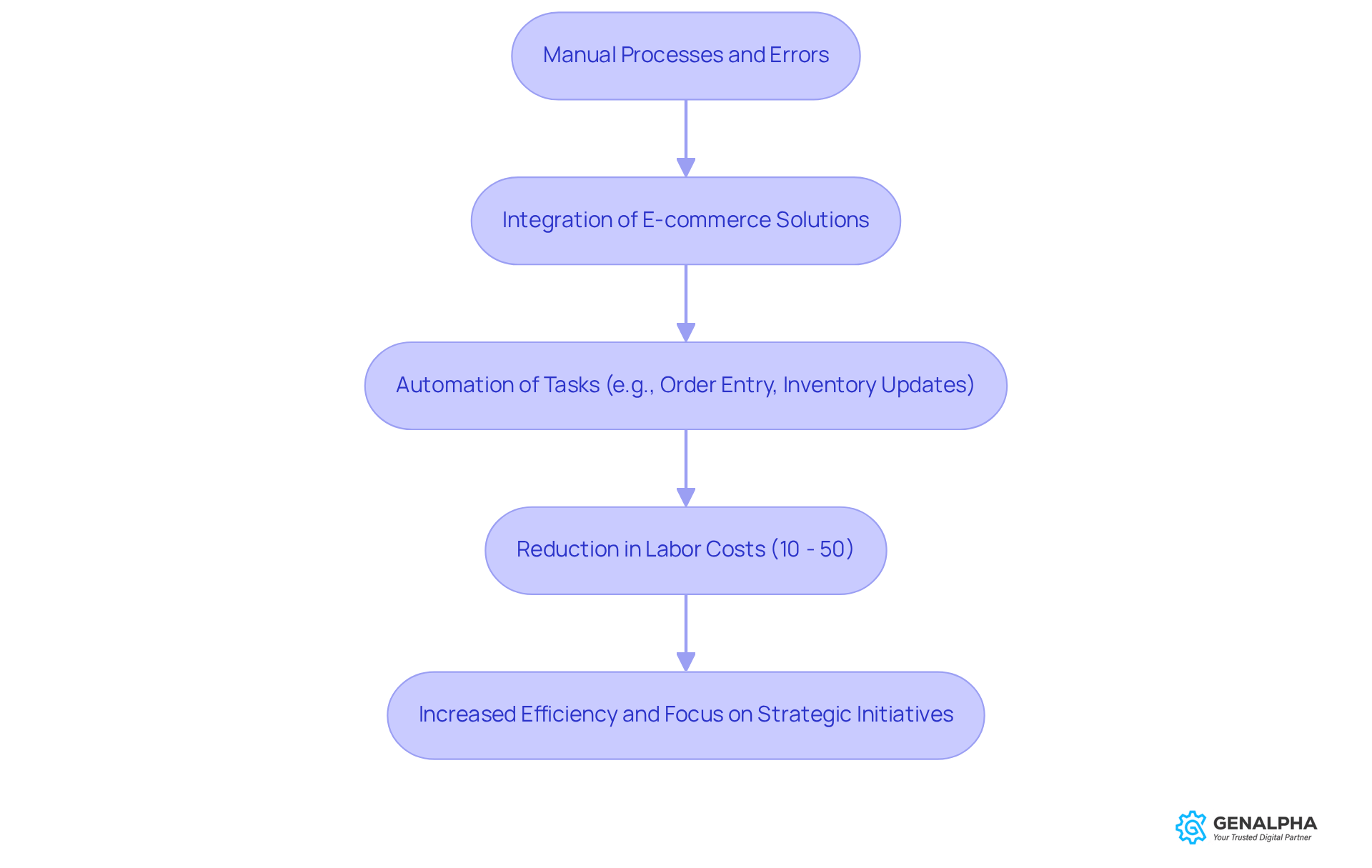
Conclusion
You know, the integration of eCommerce solutions is really shaking things up in the manufacturing sector. It’s all about enhancing operational efficiency and driving growth. By automating processes, improving data accuracy, and optimizing inventory management, manufacturers can respond quickly to market demands while ensuring a smooth customer experience. This shift doesn’t just cut costs; it also creates a more agile and competitive business environment.
So, what’s the big takeaway? Key insights show just how transformative integrated eCommerce systems can be. Think about how they enhance customer engagement through personalized experiences and leverage data analytics for smarter decision-making. The benefits are pretty clear! Manufacturers that are embracing these technologies are seeing significant boosts in sales efficiency, operational visibility, and customer loyalty. As the landscape continues to evolve, the focus on integration is only going to increase, making it essential for businesses to adapt and thrive in this digital age.
Ultimately, the journey toward improved manufacturing efficiency through eCommerce integration isn’t just about keeping up with change—it’s about grabbing those opportunities for innovation and growth. As manufacturers set their sights on 2025 and beyond, prioritizing these strategies will be key to building a resilient, efficient, and customer-centric operation. Embracing integrated eCommerce solutions is a crucial step toward achieving long-term success in an increasingly competitive marketplace. So, are you ready to take that leap?
Frequently Asked Questions
What is the main focus of GenAlpha Technologies?
GenAlpha Technologies specializes in providing integrated eCommerce solutions that enhance operational efficiency for producers by automating processes like order management and client interactions.
How does the Equip360 platform benefit producers?
The Equip360 platform offers real-time inventory updates and order tracking capabilities, allowing producers to quickly adapt to market demands and consumer needs, resulting in improved responsiveness and customer satisfaction.
What impact do online commerce investments have on manufacturers?
Approximately 39% of manufacturers report revenue growth directly from online commerce investments, and 38% of those using GenAlpha's tools experience improved business efficiency.
Can you provide an example of a success story related to GenAlpha's tools?
Alliant Power has saved over 100 hours a month on manual order entry by utilizing the Equip360 platform.
Why is embracing online commerce important for manufacturers?
As the manufacturing landscape evolves, embracing online commerce is essential for staying competitive in 2025 and beyond.
How do integrated eCommerce solutions enhance customer experience?
They enable smooth interactions at every touchpoint, allowing manufacturers to offer personalized experiences and simplified purchasing processes, which build trust and enhance customer satisfaction.
What percentage of consumers prefer brands that offer personalized experiences?
80% of consumers prefer brands that provide personalized experiences.
How does focusing on consumer experiences impact revenue?
Brands that prioritize outstanding consumer experiences generate about 5.7 times more revenue than those that do not.
How does integration improve data accuracy for manufacturers?
Integration centralizes information across different platforms, ensuring all departments work with the same up-to-date data, which minimizes discrepancies and supports quality control standards.
What is the predicted impact of centralized data on manufacturers by 2025?
The importance of centralized data will grow, as manufacturers will increasingly rely on data-driven insights to thrive in a competitive landscape.
What benefits have manufacturers experienced by adopting centralized data strategies?
Manufacturers have seen enhancements in integration eCommerce, improved product quality, and more streamlined processes through centralized data strategies.




